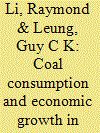|
|
|
Sort Order |
|
|
|
Items / Page
|
|
|
|
|
|
|
| Srl | Item |
| 1 |
ID:
103399


|
|
|
|
|
| Publication |
2011.
|
| Summary/Abstract |
China, now the world's second-largest economy, is worried about energy security, which underpins the core objectives of Beijing and the political legitimacy of the Communist Party of China. The purpose of this study is to explore certain popular myths about China's energy security. The study consists of six parts. After the introduction, it formulates the obscure concept of "energy security" and attempts to contextualize it with "Chinese characteristics." Then it explicitly points out that the largest driver of oil demand by China as the "World's Factory" is transport instead of industry. Next, it explores the effectiveness of transnational pipelines as a measure of energy security and explains why they are less effective than many observers have previously assumed. Furthermore, it investigates the global expansion of Chinese national oil companies and questions their actual contribution to energy security. A few concluding remarks then follow.
|
|
|
|
|
|
|
|
|
|
|
|
|
|
|
|
| 2 |
ID:
094256


|
|
|
|
|
| Publication |
2010.
|
| Summary/Abstract |
Over the past two decades, China's oil demand has risen steeply. In 1990, it was only about 25% higher than that of 1978, the year economic reform was introduced. By 2008, it had reached 396.0 million tons, roughly four times the 1978 level, making China the second largest oil user worldwide. The country became a net oil importer in 1993, and between 1993 and 2008, its net import dependency-a yardstick for energy security-soared from 7.5% to 50.0%. China's increased demand for oil has made the country a global energy player of critical importance. Although the literature on the global implications of China's oil use has proliferated, relatively few studies have attempted to examine "how China uses oil." Hence, this study covers every oil-consuming facility and sector in China, exploring the patterns of, and factors involved in, oil demand by power plants, oil refineries, heat plants and, gas-works, and industrial, transport, agricultural, household and commercial sectors. It concludes that in virtually all sectors in China, oil demand will grow, with transport and industry leading the way.
|
|
|
|
|
|
|
|
|
|
|
|
|
|
|
|
| 3 |
ID:
111096


|
|
|
|
|
| Publication |
2012.
|
| Summary/Abstract |
The aim of this paper is to re-examine the relationship between coal consumption and real GDP of China with the use of panel data. This paper applies modern panel data techniques to help shed light on the importance of the heterogeneity among different regions within China. Empirical analyses are conducted for the full panel as well as three subgroups of the panel. The empirical results show that coal consumption and GDP are both I(1) and cointegrated in all regional groupings. Heterogeneity is found in the GDP equation of the full panel. The regional causality tests reveal that the coal consumption-GDP relationship is bidirectional in the Coastal and Central regions whereas causality is unidirectional from GDP to coal consumption in the Western region. Thus, energy conservation measures will not adversely affect the economic growth of the Western region but such measures will likely encumber the economy of the Coastal and Central regions, where most of the coal intensive industries are concentrated.
|
|
|
|
|
|
|
|
|
|
|
|
|
|
|
|
| 4 |
ID:
109371


|
|
|
|
|
| Publication |
2011.
|
| Summary/Abstract |
The integration of China into the world oil market is an important issue for at least two reasons. First, the influence of the country on the world oil market is dependent on the level of the integration. Second, integration into the world oil market means that China is opening itself up to potential disturbances in the world market and this leads to significant energy security concerns for the country. The aim of this paper is to investigate whether or not China is an integral part of the world oil market. By reviewing the relevant trade and pricing policies of the Chinese government as well as the behavior of the Chinese national oil companies, we find that China is actively engaging itself in the world oil market. Our time-series results show that the Chinese oil price is cointegrated with the major oil prices in the world and a high degree of co-movement between the prices is found. Causality between the price pairs is found to be bi-directional in most cases. The empirical results suggest that China is now an integral part of the world oil market.
|
|
|
|
|
|
|
|
|
|
|
|
|
|
|
|
|
|
|
|
|